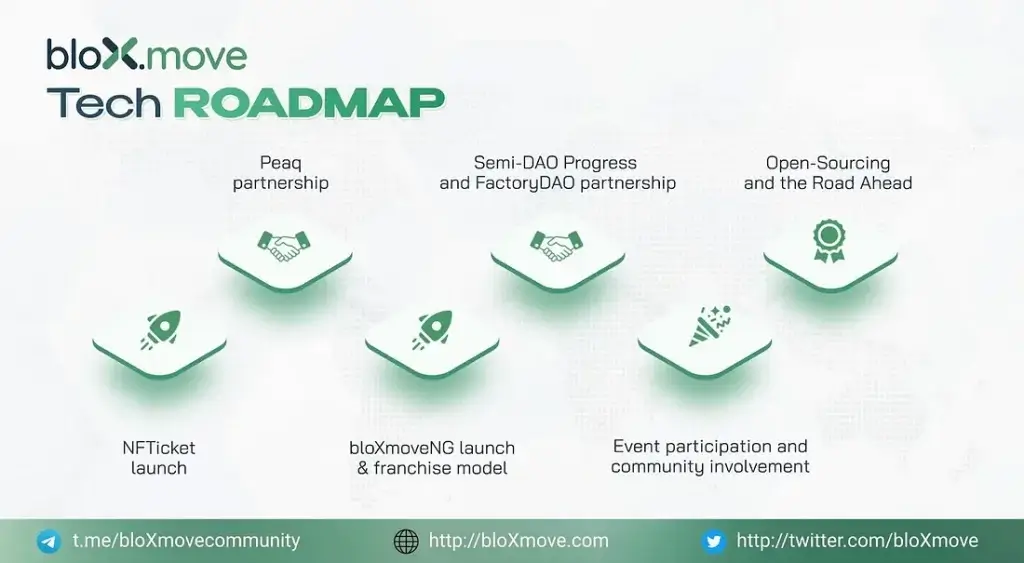bloXmove concludes M4All project with Blockchain Showcase Region Mittweida
Blockchain technology in everyday mobility


Seamless mobility roaming enabled by bloXmove’s decentralized blockchain technology — since April this year we have been part of the Mobility4all initiative in Mittweida and worked on bringing truly decentralized mobility to life. Our partners in this were the University of Mittweida, Blockchain Showcase Region Mittweida, Volksbank Mittweida, Mocci and TIER.
Together we built a fully functional Mobility Blockchain Platform with bloXmove’s NFTicket protocol at the core. Furthermore, we conducted extensive field tests in collaboration with TIER which brought e-scooters not only into the city but also to more rural areas. After the closing presentation last week, we are happy to share the results and conclusions from 9 months of work.
A special point of pride is, that the reference vehicle we used, a custom-built electric scooter, has been equipped with and accesses the NFTicket blockchain platform through a built-in hardware wallet.
This, combined with the fact that the pilot operates without any middlemen and is 100% on-chain, points to the true forward-looking, fully decentralized and disruptive design we applied.
Project results from the 9-month-journey
The goal of the collaboration set in the beginning of 2022 was to create a first pilot project to test and roll out our shared idea of frictionless mobility around the city of Mittweida in Saxony, Germany. With the University of Mittweida and the local ‘Blockchain Showcase Region Mittweida’, the city is a prominent hub for blockchain technology in Germany and brought the advantage of a greenfield approach as the region isn’t overrun with existing providers. This meant that the team could truly test out the challenges of rural areas, bringing mobility concepts to the end consumers and implementing decentralized technology to handle first test transactions. With Mocci and TIER joining the project along the way we were able to bring an e-scooter fleet to the city and not only offer the residents of Mittweida micro-mobility options but also operate in real-life conditions. Thanks to the immense support the initiative received from both the private and the public sector but most importantly the city of Mittweida itself, the team could gather a lot of relevant data. From mobility options, movement patterns to user acceptance and the technical implementation process — we were able to experience everything with first-hand data.
bloXmove NFTicket got implemented

bloXmove recently launched our brand new NFTicket protocol which offers functionalities such vouchers, collectibles, to certificates and mobility tickets embedded using NFTs as its carrier token. The origin of this protocol lies in the concept of decentralized mobility solutions. NFTickets are an obvious mechanism to use for access-based services such as ride-hailing, public transport, concerts, or sports events. While concert and event tickets are “check-in” only, mobility requires “check-in/check-out” (CI/CO) ticketing, where a ticket is used to start the service, but payment can only be calculated and settled after the service has been delivered. This is the most advanced functionality our NFTickets offer which could be implemented in the test solution within the M4all initiative.
Technical excursion in a nutshell — 4 core ingredients
Components of the decentralized pilot system

What’s Next?
The outcomes are great, but we also analyzed room for improvement:
- We were not fast enough in onboarding more mobility partners and developing the foundation-based governance with a clear business model.
- Partners like mocci postponed hardware delivery to Q1 2023.
- We need to intensify the participation of the web3 communities into open-source testing and development.
What sounds like 3 gaps is only the chance for the next year:
So, our promising answers to that: mocci will extend the micro mobility offer by Q1 next year with their e-bikes, so there will be even more options for the users. The project team will check and define the idea of building a “decentralized mobility” community which can further develop open-source components.
We could gather a broad range of research results and development and stakeholder requirements to enable a functioning mobility platform. With this information the project partners are now well equipped to transfer the concept to new and similar markets.
From Mittweida to Lagos and Kano
bloXmove will use everything we learned and apply it to our upcoming go-live in Nigeria — which will be launched in Q1/Q2 2023. But also, other emerging countries in Africa or South America could be interesting as the pressure on the current system created by inflation and aggregator models is steadily increasing. For us as one software provider it was especially rewarding to see part of our blockchain solution in action and prove that mobility can work without a centralized server backend but also where the limits are.
The details and test results we got from implementing a hardware-based blockchain client into the vehicles will now be our blueprint for following hardware projects to integrate bikes, cars, scooters — maybe even airplanes and space shuttles to Mars? One step at a time.
A very big thank goes out to all partners and doers of the M4All initiative, with your drive, trust, and willingness to just try something new. It needs more players and places to give start-ups a chance and test out new approaches, because that’s how we revolutionize and optimize existing systems — like in the power and mobility spaces.

